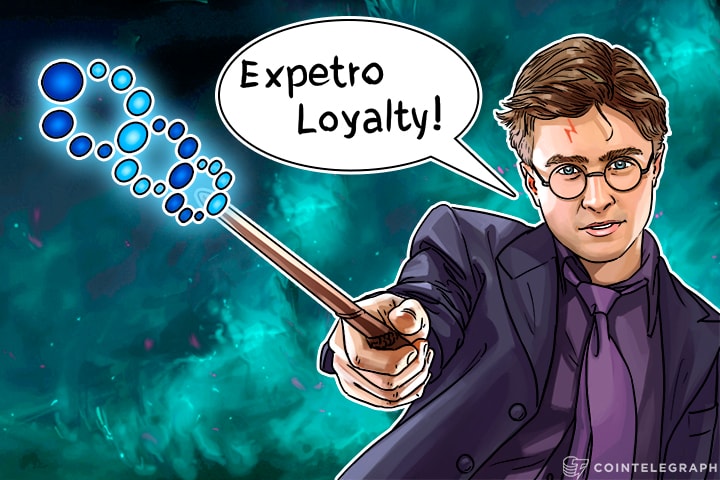Blockchain has already demonstrated its ability to disrupt many industries. There is a whole load of companies playing around with Blockchain only the laziest haven't thought of new applications for it.
Obviously, Blockchain is not a panacea for every problem. Does it have the potential to deal with challenges in the loyalty rewards industry?
Blockchain certainly has a potential to bring changes to the industry but perhaps it would be fairer to consider it as a system facilitator rather than a replacement for a current system. Besides, the success of the undertaking would largely depend on whether enough companies actually adopt the technology meaningfully.
Loyalty programs are underutilized
Loyalty programs are often considered as one of the most efficient ways for businesses to retain customers. Some companies succeed in building an attractive loyalty program, while other businesses, mostly small ones, struggle to engage with their customers.
Deloitte Center for Financial Services has recently published a report outlining some reasons why we should be looking at Blockchain-based solutions for improving customer loyalty rewards programs.
The report stated that most loyalty programs offered by U.S. companies are underutilized nowadays. The main reason for that being the lack of uniform management systems bringing a lot of confusion for customers making them eventually leave the programs.
What if we could access multiple loyalty programs on a single app being able to manage our collected points? Besides, for business itself such programs are getting extremely costly to manage, so why bother if you are losing more than you gain?
Blockchain is what the doctor ordered?
Blockchain could, in theory, offer a solution to these problems providing a tool by which loyalty programs could be functioning in a logic similar to the one behind any digital currency.
The technology could help to cut out intermediaries that exist in the rewards delivery and redemption process, allowing instantaneous and secure creation, redemption, and exchange of reward points across programs, providers, even industries.
The authors say:
“Loyalty rewards are also a type of digital currency, so it is only natural that the engine that enables Bitcoin to be transacted among multiple parties in exchange for services, goods, and even other monetary tenders could do the same for loyalty reward points.”
There are a number of technology companies looking to come up with a technology that could be at the core of a perfect loyalty program.
Loyyal is building a universal loyalty platform leveraging Blockchain technology to increase efficiency and improve engagement for commerce and beyond. China UnionPay+IBM are developing a Blockchain-based system to trade loyalty point. Ribbit and Blockpoint have also been working on new solutions for loyalty programs that could be powered by Blockchain.
In addition, technology has potential to leverage knowledge of customer preferences in real time and even enable them to become the program operators, as they will be the ones to choose how to spend their points, whether it be to direct them to upgrade a flight ticket or spend them in a restaurant.
The problem of centralization
Interestingly enough one of the most important implications of Blockchain-based loyalty solutions is rather opposite to the very nature of it. When building a perfect loyalty program the goal is to centralize the process, while the main value of Blockchain is the fact that it is distributed.
Anthony Lewis, Director of R3 Lab & Research Centre in Singapore, argued in his article On Loyalty Point Schemes and Blockchains that using Blockchain makes sense if the final goal is to make running loyalty programs cheaper, easier and more secure, improving visibility over issuance and redemption of points.
However, technology cannot really solve the problem of centralization itself. Well, companies can actually reach it ´manually´ with no need to involve Blockchain.
How would it work?
An online protocol programmed building blocks and smart contracts would give the loyalty platform power to act without intermediaries, we got it. But what else? Let´s take a look at the solution offered by Toronto-based startup Chain of Points. The company is developing a modern and accessible alternative to standard loyalty programs deploying Blockchain technology.
Chain of Points works similarly to a cryptocurrency but with additional mechanisms that allow it to become the technical backbone of the loyalty industry. Points the currency within the system, is used to collect, redeem or transfer rewards from Merchant to Customer, Customer to Customer, and Merchant to Merchant.
The comprehensive cryptography offers ways to fully and flexibly create gift cards, tokens, and even general legal contracts by using our own easy-to-understand language for implementing Ricardian Contracts.
A company spokesperson says:
“A Delegated Proof-of-Stake-based consensus algorithm is used to validate transactions in the network, making the system truly scalable and on a par with the transaction speeds of established financial services such as VISA. By its very nature, a digital solution is more appealing to the younger generations.”
A powerful API makes Chain of Points compatible with the sophisticated workflow of medium-sized and big businesses. Large businesses with well-developed loyalty programs will be able to move it to the next level through providing value-added rewards to other businesses.
The solution is attractive to small and home business owners. Small businesses, which did not have a loyalty program before, will get access to an interlinked network of other businesses and be able to offer its clients loyalty point that could be redeemed in a wider network.
Customers are satisfied because their rewards gain more liquidity and merchants gain more flexibility in managing deals, contracts and collaborations and get the ability to tailor rewards to their individual Customers.
